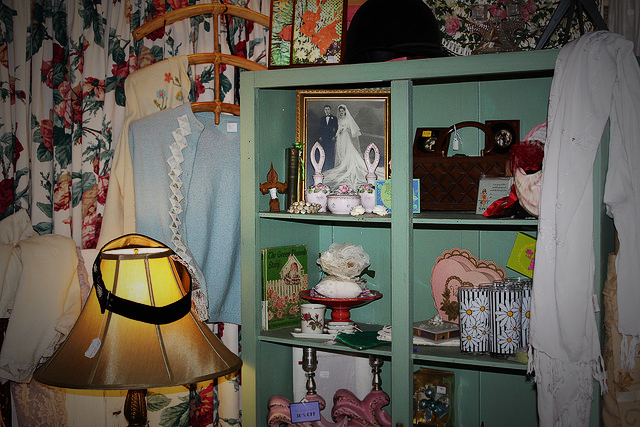Alison Barker
If it wasn’t clear before, I’ll spell it out now: MeeMaw had something that was winnowing her bones, said the doctors. And it came with a side helping of dementia. Whether or not you could backdate this diagnosis to MeeMaw’s self actualization, when she decried most modern conveniences and forced us to move into the one-room shack of her birth, sloppily excavated from Kingdom Come holler and re-positioned right next door to our comfortable suburban tract home, I don’t know.
I plodded on with her plans for me—to succeed in school and secure acceptance to a rigorous college—though I knew she no longer cheered me on. You see, once MeeMaw pinned most of the blame for her life’s misdirections on “male desire,” or mayul deezah as she called it, she moved onto bigger targets than my PeePop: the educational institutions that had encouraged her to forget her hillbilly culture. And then, school in general. She looked with disgust at my rows of A’s and teachers’ congratulatory comments on my essays.
MeeMaw was sick and growing sicker by my senior year of high school, and there was no way to ask her what she wanted for me, if not college acceptance and academic achievement.
Once our town postmistress and MeeMaw’s ever-present companion Miss Polly Emerald moved into the one-room cabin to help take care of her, I had the freedom to return to the comforts of our split-level ranch on an almost-nightly basis. I’d stop at the shack straight from school to force down whatever pioneer cooking Miss Polly was serving up, and to swing MeeMaw in her hammock to and fro until she dozed. Then, I returned home to do my homework under the warm glow of ceiling lamps, with a side of Kraft Macaroni and Cheese.
One Saturday, she sent Miss Polly to get me before our scheduled lunch hour together. The tang of oniony ramps and over-ripe cantaloupe assaulted me upon entry. A long table and two benches on either side of it were the sum total of MeeMaw’s furniture, aside from the feather down covered hammock strung up in the corner. In this cocoon MeeMaw bound herself and overlooked her lair and—let’s be clear—her lover, Miss Polly, who toiled in MeeMaw’s place at the table, which was the centerpiece of the place, cluttered with sprigs of dried herbs tucked here and there in soiled plastic organizers. Rows of bottled tinctures stood at one end of the long table.
When I entered that day, Miss Polly jumped up from the table to concentrate on a mess of foul-smelling ramps she stirred in a pot over the fire.
I climbed the metal ladder left against the wall to greet MeeMaw. She wore a translucent, white gown abundant in material that covered everything but her head and hands. Her white hair had gone without a perm for weeks, so tendrils flattened and flopped this way and that. Fire crackled in the fireplace. The odor of the heavy jugs of compost that waited to be emptied by the door would follow me after I exited; it would enter my dream space where it has stayed.
Her eyes had grown cloudy with cataracts. “I’m searching for an essay I wrote for you,” she began.
“Oh, MeeMaw, it’s me, CommaTaryn.” I thought perhaps she meant to speak to Polly, or maybe some ghostly schoolmarm.
“I know damn well who you err an I said I’m a lookin’ fer somethin’!” She screeched at me in Hillbilly, her dialect of choice in her last days. At this point she had lost some of her hold on reality so I couldn’t be blamed for second-guessing. Before the conversation was through, MeeMaw was convinced there was an entire book she had authored, hidden in her bedclothes.
“Aw, hell, I’ll have to remember. Here goes.” Wizened pads, indistinguishable meshes of callous, bones and skin, she patted the bedclothes violently and decisively. I shifted my weight and the metal ladder screeched under me.
“Comma Tara, now you listen up. I’ve been battling my whole life to protect myself from them.”
“Who’s them?”
She lowered her voice conspiratorially. “The schoolmarms,” she hissed.
“MeeMaw, where’s PeePop?” I asked, hoping to change the subject from crazy to something I could actually use. Better now than never, I figured—I had learned to doubt MeeMaw’s claim that PeePop had died in a faraway hospital.
“Now lissen here,” she said. “Lissen to me. I’m the MeeMaw.”
Then MeeMaw asked me if I had ever heard her recite her published poem. The postmistress harrumphed then, and I steadied myself on the ladder and looked down at Miss Polly, who scowled up at me and shook her head. “You’ll excite her. Better not.”
MeeMaw cleared her throat of what sounded like wet gravel and in an eery singsong voice recited:
With a song in my heart
I followed my nose
Into the woods, and in search of love’s clothes.
And then she forgot the words. Her eyes flashed and the creases in her stork-like neck sharpened and formed tiny dart-like peaks. She drew in a pocket of air. I drifted off into my own thoughts, maybe because all the blood was leaving my head and pooling in my feet there on the ladder. Underneath us was the sound of their vegetarian dinner splattering about in lard.
“All my life has been a lie,” MeeMaw said then. I gazed into her broken glass eyes. The postmistress suddenly stopped her clanging about and then only a dreary hiss cankered on around us. Miss Polly coughed—I thought—pointedly. MeeMaw seemed to re-consider then and revised it to “a series” of lies with “small shining gaps” of truth between. After looking down at Miss Polly, who smiled up at her grudgingly, MeeMaw gestured with her oar-like hands toward the wax paper covered window and plunged into her bedclothes. She produced a mortar and pestle with a mound of green and red berries. The movement caused the hammock ropes to groan.
I glanced down to see Polly staring up at us, susurrus skillet in hand. The tight, fleshy berries burst with wet gasping sounds under the pressure of MeeMaw’s dull stone. I thought she stared at me, but it was hard to tell with the veil of disinterest and distance that dementia had cast upon my grandmother. She stiffened her posture into a rod in the middle of her cocoon of sheets and comforter, all strung up by the ladle shape of the hammock. MeeMaw set her jaw.
“Bring me the smudge stick, Polly,” MeeMaw said.
Whimpering, the postmistress ascended the ladder, and we glared at each other for a half a second: she, puffy eyed, me, eyes narrowed, neck stiff. She stepped just high enough to reach past me and hand something up to MeeMaw.
MeeMaw lit the leaves then ground them into the paste in her lap. Before I knew what was happening, her ropey arm lassoed me around my waist and with her other hand she grasped my hip to pull me tight and close.
She poked a terribly hot and long, grime-covered finger under my t-shirt on the left side of my chest. “I do this for your own good,” she said. The pain was immediate and it sucked my air out. I drew breath hard and stumbled forward into her hammock, making the ropes groan and sigh. It left a heavy charcoal mark, and it was coated with some sort of oil that would take days to wash off. I took another shallow gasp of air and teetered backward. But MeeMaw was quite strong, and due to her wide, able hands, I righted myself despite the gnawing heat across my left breast.
“Now this is just the first part,” she said. “The second part is I need to tell you what,” she stopped and gasped suddenly for air. With a burning sensation upon my heart, I watched my MeeMaw turn parchment, suck in her last earthly breath, choke on it, and die.
Alison Barker’s novel in progress, The Wetlands of America, was a 2014 shortlist finalist for the William Faulkner-Wisdom writing award for Novel-In-Progress. She is a contributor at Los Angeles Review of Books, Identity Theory, Bookslut, and other publications. She founded Nola Studiola, a New Orleans-based website of interview, essay, and multi-media art. NS is currently seeking curators of all artistic media. Follow her on Twitter at @labdog77.




